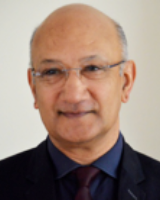Daya Reddy is a graduate of the Universities of Cape Town and Cambridge, and currently holds the South African Research Chair in Computational Mechanics in the mathematics department at the University of Cape Town. Much of his work is concerned with mathematical analysis and computational simulation in solid and fluid mechanics.
He was a founder member in 2003 of AIMS, the African Institute for Mathematical Sciences (AIMS), a pan-African network with centres for graduate education, research and outreach currently in five African countries, and chairs the AIMS South Africa Council.
Daya Reddy is President of the International Science Council (ISC), the largest non-governmental science organization, which seeks to advance science as a global public good. He served a term as President of the Academy of Science of South Africa, and is concluding two terms as co-chair of the Policy arm of the InterAcademy Partnership.
Daya Reddy is an elected Fellow of the International Association for Computational Mechanics; of TWAS, The World Academy of Sciences; and of the African Academy of Sciences. He is a recipient of the Award for Research Distinction of the South African Mathematical Society, the Order of Mapungubwe, awarded by the President of South Africa for distinguished contributions to science, and of the Georg Forster Research Award from the Alexander von Humboldt Foundation in Germany.
Topic Science Literacy and the Public Value of Science
Abstract
The central role of science in successfully addressing major global challenges, for example as encapsulated in the Sustainable Development Goals, is undisputed. Of equal importance is the role of scientists in public discourse: to advocate the values of science and the scientific method, and in so doing to ensure that these are appreciated and understood in societal debates and in processes leading to public policymaking.
There is a particular urgency to public engagement around such issues, given the current environment in which pervasive digital technologies enable the widespread dissemination of expressions of science denialism and pseudo-scientific views, often coupled with attempts to undermine the fundamental values of science. The scientific community has a responsibility to articulate the methods and values of science, communicate the importance of science, and generally instill trust in science. In this way individuals and groups are in a position to understand the nature of scientific enquiry, and of scientific basis for consensus views on major issues. This applies particularly to those issues that have attracted anti- or pseudoscientific interventions, such as for example climate change and vaccination. The lecture will include a description of actions and activities by the International Science Council in relation to science as a global public good.
